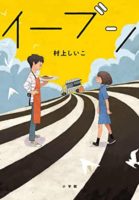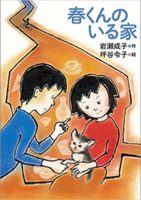
村上しいこ/作 まめふく/画
小学館
2020
『イーブン』(読み物)をおすすめします。
中1の美桜里(みおり)は、父親のDVが原因で両親が離婚し、スクールカウンセラーの母親と暮らしているが、友人との関係がうまくいかず不登校になっている。そんな折り、キッチンカーでカレーを売っている貴夫と、その助手をしている高校生だがやはり不登校の登夢(とむ)に出会う。
美桜里もキッチンカーを手伝ううちに、登夢の母親が、子どもをネグレクトしたあげくに犯罪の手先までやらせていたことや、今は貴夫が保護者がわりに登夢と暮らしていることなどを知る。一方両親の離婚について考え続ける美桜里は、母親とも父親とも対話を重ねるうちに、人間関係の複雑さに目を向けるようになる。いつしか恋心を抱くようになった登夢からもさまざまなことを学ぶなかで、美桜里は、親子にしろ男女にしろ夫婦にしろ、互いに尊重し合える対等(イーブン)な人間関係が重要だと気づき、それはどうすれば可能なのかをさぐっていく。やがて美桜里の父親は、自分も親から虐待されていたこと、言葉で表現するのが苦手で暴力や暴言に訴えてしまったことを初めて打ち明ける。弱点もさらけだして本音で語り合う関係があれば、そこから道がひらけていくことが示唆されている。自らも虐待体験を持つ著者が、子どもたちに寄り添って一緒に考えようとする作品。
13歳から/親の離婚 キッチンカー 虐待 DV
Even
Twelve-year old Miori’s parents divorced because of her father’s abuse, and Miori now lives with her mother, a school counselor. Miori has stopped going to school because of difficulties getting along with her friends. One day, she meets Takao, a man who runs a curry food truck, and his assistant, Tom, a high school student who, like Miori, is not going to school. When she begins helping Takao with his food truck, she learns that Tom’s mother not only neglected him as a child but used him to commit crimes and that he now lives with Takao, who has become his guardian. Meanwhile, Miori is constantly thinking about her parents’ divorce. Through conversations with her mother and father, she starts to see the complexity of human relationships. She also gains many insights through talking with Tom, with whom she is falling in love. During this process, she comes to realize that being on an equal or even footing is the key to good relationships, whether between parent and child, man and woman, or a couple, and begins exploring how to make such relationships possible.
One day, Miori’s father attends a meeting hosted by Miori’s mother about women’s rights. There he confides that he suffered abuse from his own parents and struck out both physically and verbally because he had trouble expressing himself in words. Gradually, Miori and Tom find the next step they can take.
Miori’s story gives us hope, demonstrating that it’s possible to find a way forward by sharing our weaknesses and speaking honestly about our shortcomings. The author, who was a victim of abuse herself, helps readers to explore this serious issue. (Sakuma)
- text: Murakami, Shiiko | illus. Mamefuku
- Shogakukan
- 2020
- 208 pages
- 19×14
- ISBN 9784092893016
- Age 13 +
Divorce, Food truck, Abuse, Domestic violence
(JBBY「おすすめ!日本の子どもの本2021」より)
